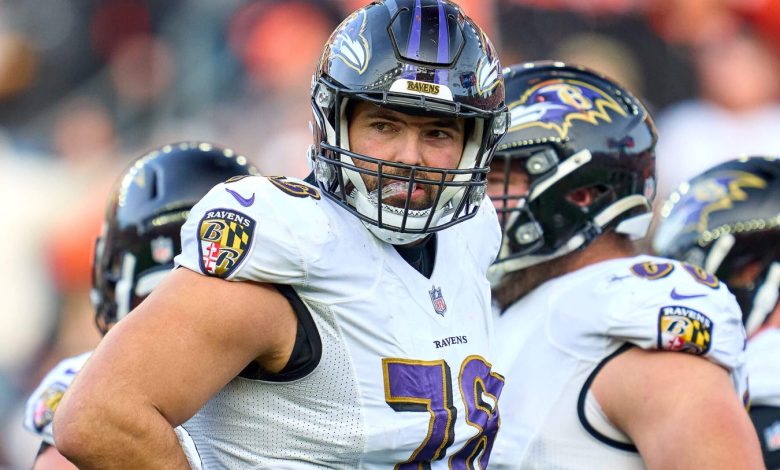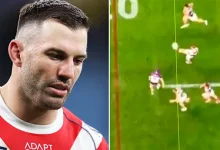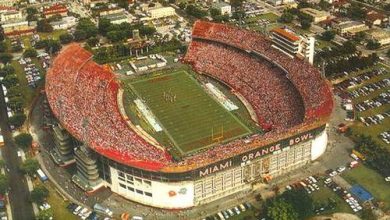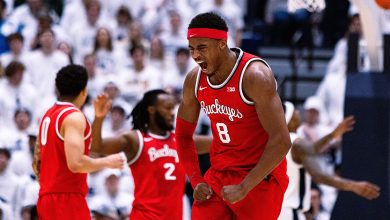The Ravens would have to pay $10 million in dead cap space to let Justin Tucker go.

In the world of the NFL, where teams constantly navigate the complex interplay of salary cap space, player contracts, and roster decisions, the financial implications of releasing or trading a star player can be immense. One such case that has recently garnered attention is that of Justin Tucker, the legendary kicker for the Baltimore Ravens. Tucker, widely regarded as the best kicker in NFL history, has been a mainstay in Baltimore since 2012. His consistent ability to deliver clutch kicks in critical moments, combined with his unmatched accuracy, has made him a fan favorite and a key component of the Ravens’ special teams.
However, like with all long-term players, the question eventually arises: How much would it cost to part ways with a player of Tucker’s stature, especially when it comes to the salary cap? In this case, the Ravens would have to absorb a significant $10 million in dead cap space if they were to release or trade Justin Tucker. This decision would have far-reaching consequences for the team’s financial future and roster construction. But why does this figure exist, and what would it mean for the Ravens’ long-term success? Let’s explore this topic in depth.
The Basics of Dead Cap Space
Before diving into the specifics of Tucker’s contract, it’s important to understand what “dead cap space” is and why it matters in the NFL. In simple terms, dead cap space refers to the portion of a player’s contract that remains on a team’s salary cap even if that player is no longer on the roster. This can occur when a player is released, traded, or retires before their contract is up.
The reason dead cap space exists is because of how NFL contracts are structured. Most NFL contracts include signing bonuses, roster bonuses, and other forms of guaranteed money that are paid upfront. When a team parts ways with a player, they are still on the hook for that guaranteed money. This money counts against the salary cap, which limits the amount of money a team can spend on player salaries in a given year.
While teams can spread the cost of dead cap space over multiple years (through prorating signing bonuses), the cost of cutting or trading a player often carries a significant financial penalty. For the Ravens, this is precisely what would happen if they decided to move on from Tucker.
The Contract Situation: Understanding Justin Tucker’s Deal
Justin Tucker, being one of the most accurate kickers in NFL history, signed a four-year contract extension with the Ravens in 2021 that made him one of the highest-paid kickers in the league. The deal was reportedly worth $23.05 million, with a signing bonus of $12 million. That signing bonus, in particular, has played a pivotal role in the financial complexities of Tucker’s contract.
Under the terms of his contract, the Ravens would have to pay a portion of that $12 million signing bonus in dead cap space if they decided to release or trade Tucker before the contract expires. The signing bonus is spread over the life of the contract, meaning that even if Tucker isn’t playing for the Ravens, the team is still responsible for the remaining portion of the bonus.
As of the 2025 season, the remaining dead cap associated with Tucker’s contract stands at approximately $10 million. This figure comes from the portion of the signing bonus that has not yet been amortized across the duration of the contract. While the Ravens could theoretically save money by cutting Tucker, they would still owe that $10 million in dead cap space.
The Immediate Financial Impact of Parting with Tucker
Let’s consider the potential immediate financial consequences for the Ravens if they were to part ways with Justin Tucker. As mentioned earlier, the team would have to absorb $10 million in dead cap space. For the Ravens, who are often in a delicate financial situation with a number of key players on the roster, this would be a significant blow.
While $10 million might not seem like an enormous sum when compared to the contracts of top quarterbacks or pass rushers, it would be a considerable amount for a kicker. Kicker salaries, while important, are generally much lower than those of star offensive or defensive players. Therefore, allocating $10 million of dead cap space to a kicker would be an inefficient use of the team’s resources.
Moreover, the Ravens would not immediately recoup this money. The NFL’s salary cap operates on a year-to-year basis, meaning that teams must navigate the financial restrictions of each season. Releasing Tucker would provide some short-term savings in terms of his annual salary, but the immediate hit to the salary cap would likely leave the Ravens with little room to make other moves to strengthen their roster.
Long-Term Financial Ramifications
While the immediate impact of a $10 million dead cap charge would be substantial, the long-term ramifications are equally significant. The Ravens’ front office would need to carefully assess how such a move would affect their ability to build a championship-caliber team in the future.
In recent years, the Ravens have been in a constant balancing act, trying to surround quarterback Lamar Jackson with enough talent to make a deep playoff run. The team has invested heavily in both its offense and defense, securing key contracts for players like Jackson, linebacker Roquan Smith, and cornerback Marlon Humphrey. However, in a league with strict salary cap constraints, every decision counts.
If the Ravens were to release Tucker, they would free up some cap space for the upcoming season. But this would come at the cost of dead cap space, and it could limit their ability to make future moves. For example, the Ravens could find themselves in a situation where they need to extend or sign other key players, and the dead cap hit from Tucker’s departure would limit their flexibility.
Moreover, dead cap space doesn’t simply go away. The team would have to carry it as part of their salary cap calculations for at least one season. While the cap hits would be spread out, it could limit the team’s ability to make major roster improvements, whether through free agency or trades. For a franchise with playoff aspirations, the timing of such a decision would be critical.
Why the Ravens Would Likely Keep Tucker
Given the financial consequences, one might wonder why the Ravens would even consider parting ways with Justin Tucker. After all, Tucker has been the most reliable kicker in NFL history, setting numerous records and securing countless game-winning kicks. His value goes far beyond just his statistics; he provides stability in a position that is often overlooked but can be the difference in tight games.
Additionally, Tucker is not only a key player on the field but also a beloved figure in the Ravens’ locker room and fan base. Cutting or trading him would likely create significant backlash from fans and media, making it an unappealing option for the franchise. The emotional and cultural impact of parting with a player of Tucker’s stature cannot be understated.
From a financial standpoint, it would make more sense for the Ravens to try and find a way to keep Tucker on the roster. Given his status as one of the best kickers in NFL history, it is unlikely that the Ravens would find a more reliable or effective kicker for a similar price. In addition, Tucker’s leadership and consistency on the field are invaluable assets to the team. While the $10 million dead cap space is a considerable burden, the benefits of keeping Tucker on the roster likely outweigh the financial challenges.
Could the Ravens Rework Tucker’s Deal?
Another potential avenue for the Ravens would be to try and rework Tucker’s contract in order to reduce the immediate salary cap burden. This could involve converting some of his base salary into a signing bonus, which would allow the team to spread out the cap hit over future seasons. Alternatively, the Ravens could extend Tucker’s contract and add years to the deal, pushing some of the cap hit into later years when the team might have more room under the cap.
However, this approach would require Tucker’s willingness to negotiate and might not necessarily solve the team’s financial problems. The Ravens would still be locked into a significant financial commitment to Tucker, but it could provide them with more flexibility in the short term.
The Future of Justin Tucker and the Ravens
At the end of the day, the decision to part with Justin Tucker will likely hinge on a number of factors, including the Ravens’ long-term goals, their financial flexibility, and the team’s overall direction. While $10 million in dead cap space is a significant financial burden, the value that Tucker brings to the team—both on and off the field—likely makes him worth that cost.
For now, it seems unlikely that the Ravens would move on from Tucker. The kicker’s exceptional skill, leadership, and legacy within the franchise make him a cornerstone of the Ravens’ special teams unit. Unless a drastic shift in circumstances occurs, it seems that Justin Tucker will remain with the team for the foreseeable future, continuing to solidify his place as one of the greatest kickers to ever play the game.








